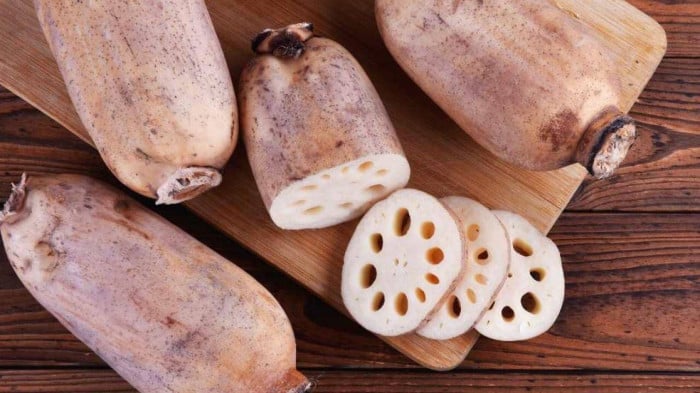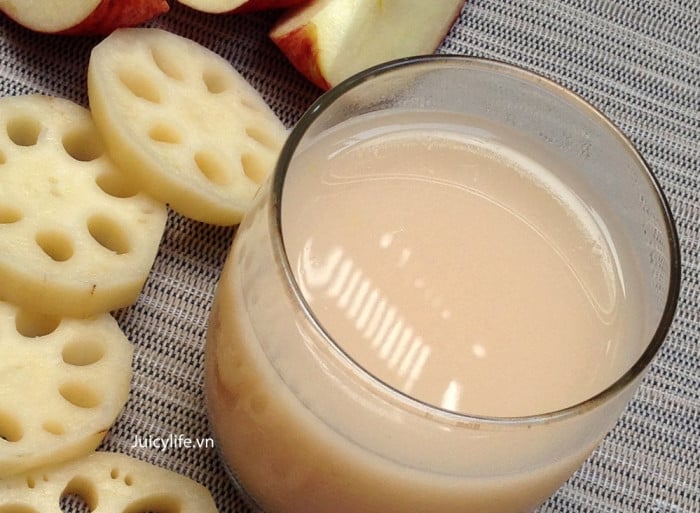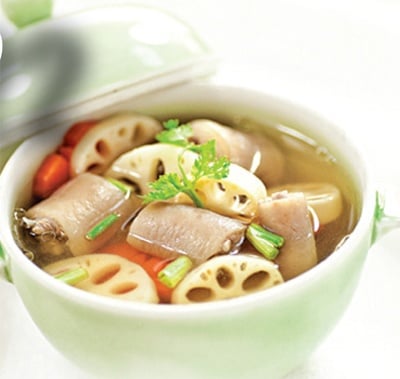Lotus root is one of the most popular ingredients in Vietnam. This root has many wonderful uses such as enriching the blood, treating stomach bleeding, clearing blood vessels, preventing cancer and helping to lose weight.
Moreover, lotus root is not only a "health medicine" but also one of the popular ingredients used to prepare delicious and nutritious dishes.
Lotus root is increasingly appreciated for its content of phenolic compounds known as natural antioxidants.
Almost all parts of the lotus plant are used in Eastern culinary culture. Lotus flowers, leaves, roots, seeds, etc. are all used for different dishes.
Lotus root is the edible root of the lotus plant, a familiar aquatic plant in Vietnam. When eaten, lotus root has a sweet taste and moderate crunchiness. Lotus root is highly valued because it contains phenolic compounds which are natural antioxidants.
After cleaning, you can prepare dishes such as lotus root soup, lotus root stew, lotus root stir-fried with shrimp and meat, etc. Lotus root can be ground into powder and used to cook desserts.
Lotus root has no cholesterol and very few calories with diverse nutritional content and many vitamins, minerals and nutrients that are very beneficial for the body.
Lotus root is a good source of healthy carbohydrates and fiber, while being low in fat and sugar. Its nutritional value comes from its essential vitamins and minerals such as potassium, calcium, copper, vitamin C, vitamin B6, and iron.
The folate and vitamin C content in lotus root is essential for blood production and vascular health.
10 unexpected benefits of lotus root
Fresh lotus root has a mildly sweet taste and a crunchy texture when eaten raw, slightly powdery when cooked. It is packed with health-promoting nutrients with many surprising health benefits.
1. Protect the heart and regulate blood pressure
As a nutrient-dense food, fresh lotus root is beneficial for heart health due to its high potassium content. Many beneficial properties of potassium have been reported including vasodilation, increased GFR, and decreased renin, which helps regulate blood pressure. Furthermore, a potassium-deficient diet can cause muscle weakness, irregular heartbeat, mood swings, or nausea.
In addition, the folate and vitamin C content in lotus root is also extremely essential to help create blood and maintain healthy blood vessels.
2. Improve immune function
Lotus root is rich in vitamin C, a powerful antioxidant that protects cell membranes from the harmful effects of free radicals, increases interferon production, enhances resistance, reduces the body's sensitivity to histamine, and fights stress. Therefore, adding lotus root to your diet will help improve your immune function.
3. Liver protection
Lotus root contains high levels of polyphenolic compounds that are thought to protect liver cells. According to animal studies, lotus root powder is thought to prevent non-alcoholic fatty liver disease.
In addition, in Oriental medicine, lotus root water is also considered a drink that cools and refreshes the body.
Lotus root water helps cool the body.
4. Hemostatic and blood circulation effects
According to traditional medicine, lotus root is also known as "nguyen tiet", not only a food but also a medicine with hemostatic effects, used in cases of nosebleeds, bloody stools or urine...
Lotus root also contains a lot of Vitamin B6, which helps regulate homocysteine levels, contributing to protecting the heart and supporting blood circulation in the body.
5. Helps reduce inflammation
Fermented lotus root was investigated to reduce ethanol/HCl-induced gastric ulcers in mice by regulating inflammation-related genes. The results showed that fermented lotus root can effectively improve inflammatory diseases. However, the mechanism of this inflammation reduction is still unclear and more studies are needed to confirm.
6. Reduce the risk of birth defects
Lotus root provides several important nutrients for maintaining a healthy pregnancy, including folate (vitamin B9). Pregnant women especially need to get enough folate to prevent dangerous birth defects.
Additionally, lotus root also provides choline, iron, and calcium. These micronutrients support a healthy pregnancy.
7. Rich in vitamin B, good support for the nervous system
The benefits of lotus root also come from its valuable source of B complex vitamins such as pyridoxine, folate, niacin, riboflavin, pantothenic acid and thiamin.
In particular, pyridoxine (vitamin B6) plays an important role in supporting nerve functions. Therefore, when the body lacks this vitamin, you will feel tired and uncomfortable, sometimes even leading to depression.
Adequate daily intake of pyridoxine helps control nervous irritability, headaches and stress. Vitamin B6 also reduces the risk of heart attacks.
Polyphenol active ingredients extracted from lotus root show effects in helping to maintain skin health.
8. Improve skin health
Research examining the active ingredients of Polyphenols extracted from lotus root shows that they help maintain skin health by reducing the activity level of metalloproteinases in skin cells through anti-inflammatory properties.
9. Rich in fiber, good for the digestive system
Insoluble fiber in lotus root increases the volume and speed of food movement in the intestines. Thereby reducing the time it takes for toxic substances to accumulate. Along with that, it helps regulate intestinal motility by drawing water into the intestines to create soft and well-formed stools.
Soluble fiber has been shown to lower cholesterol and reduce the risk of heart disease. A high-fiber diet slows the passage of food through the intestines. This helps keep blood sugar levels stable.
10. Weight control
Because lotus root is rich in fiber, it will help you feel full longer, preventing overeating and hunger between meals. A diet rich in fiber helps to hinder the absorption of nutrients. Therefore, lotus root can be known as one of the weight loss foods.
Notes when using lotus root
Despite all its nutritional benefits, lotus root is not a medicine and has no medicinal properties. You should not attempt to treat any disease with lotus root without consulting your doctor.
Lotus root contains a lot of starch. Therefore, patients with diabetes, colon or stomach problems should consider when wanting to use it regularly.
You should not eat raw lotus root. Lotus root is the root of the lotus flower, it has a high potential to contain parasites. Therefore, eating raw lotus root will increase the risk of bacterial infection and food poisoning. The best way is to cook lotus root before using.
Lotus root can be processed into many delicious dishes from soup, stir-fried or sweet soup, all with very special flavors.
4 simple ways to prepare lotus root
Grilled or fried lotus root in an air fryer will make a healthy snack.
Lotus root powder is a popular ingredient in traditional medicine because of its nutritional benefits. You can make lotus root juice from this powder and use it as a beverage. In addition, lotus root powder can be used in desserts such as lotus tea, mochi, etc.
Not only does it bring great health benefits, adding lotus root to the soup will make the broth sweeter and more delicious.
After blanching lotus root in boiling water, it can be pickled as a salad to stimulate the taste buds and prevent boredom. It is worth trying.

Source

























































![[Maritime News] More than 80% of global container shipping capacity is in the hands of MSC and major shipping alliances](https://vphoto.vietnam.vn/thumb/402x226/vietnam/resource/IMAGE/2025/7/16/6b4d586c984b4cbf8c5680352b9eaeb0)













































Comment (0)